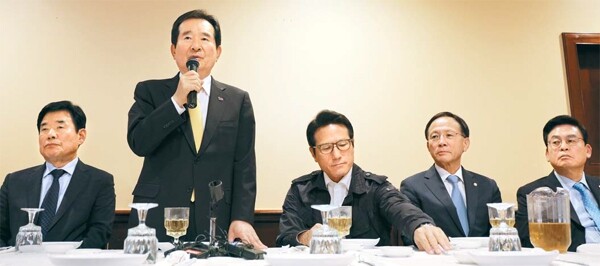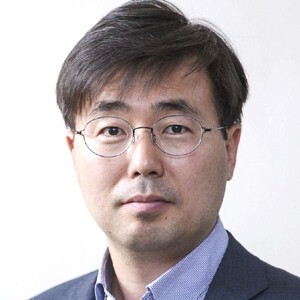hankyoreh
Links to other country sites 다른 나라 사이트 링크
[Correspondent's column] North Korean issue put on the back burner in Washington following Hanoi summit

When lawmakers from South Korea’s ruling and opposition parties visited Washington, DC, and New York from May 19 to 23 as part of a foreign policy forum for Korean and American lawmakers, their facial expressions were not very cheerful. After sharing opinions about North Korea-US negotiations during meetings with US State Department Special Representative for North Korea Stephen Biegun, lawmakers from the Republican and Democratic parties, and members of think tanks, South Korean lawmakers told reporters that they were “worried” and had a “heavy heart.” The US administration was frustrated by North Korea during the two countries’ second summit, held in Hanoi, Vietnam, at the end of February, and since then, the North Korean nuclear issue seems to have taken the backseat for those in and around the US government.
There are definite signs that the North Korean issue has been put on the back burner in Washington since the Hanoi summit ended without a deal. US President Donald Trump has been focusing his foreign policy on China, Iran, and Venezuela, while domestically, he has been preoccupied with fending off attacks about the Russia scandal, bragging about the strong economy, and pushing forward his immigration policy. Trump is already looking ahead to the next presidential election, in November 2020. In January and February, which was capped by the Hanoi summit, Trump tweeted about North Korea an average of 8.5 times a month; but since February, the monthly average has decreased to 3.3 times. Experts at Washington think tanks are in agreement that interest in North Korea has waned. The only attention that North Korea has received of late from Trump or the US press came during two rounds of short-range projectile launches by the North at the beginning of the month and the US’ announcement that it had seized a North Korean cargo ship.
N. Korea is agenda item that Trump can truly call his own
As the chill between North Korea and the US drags on, there are deepening concerns that even Trump, the man who has been proactive about North Korea while blasting former president Barack Obama for his administration’s “strategic patience, is going down the path of his predecessors. That’s peculiar, considering that North Korea, among Trump’s many foreign policy initiatives, is the agenda item he can claim as his own. The Trump administration’s pressure on Iran seems designed to erase Obama’s accomplishments by withdrawing from the Iran nuclear agreement, reached in 2015, and forcing regime change in the country. The trade war with China is Trump’s version of the US’ long-running struggle for hegemony with China. The attempts to usher in a new government in Venezuela is connected to steps taken by the Trump administration to walk back the US and Cuban governments’ normalization of diplomatic relations in 2015, since it regards Venezuela’s current Maduro government as being a puppet of Cuba.
But the North Korean issue is different. During the presidential election, Trump publicly declared his willingness to sit down with Kim Jong-un. After a period of bluster about “fire and fury,” Trump accepted the hand extended by Kim and became the first US president to meet with the North Korean leader for not one, but two, rounds of nuclear talks. Whereas previous presidents had basically neglected North Korea while staying inside the framework of the Six-Party Talks, Trump opened a new chapter in North Korea-US dialogue through the “top-down method” between the two leaders. The result was a definite reduction in tensions on the Korean Peninsula. Trump’s negotiations with North Korea have come to be regarded as his signature foreign policy model; when he threatened the “official end of Iran,” CNN said that Trump was using his “North Korean playbook on Iran.”
The problem is that dialogue has given way to deadlock. The longer the deadlock lasts, the harder it becomes for Trump to claim that his North Korea policy is a success. Trump finds himself in a precarious position: his much-vaunted achievement of bringing North Korea’s nuclear weapon and missile tests to a halt will crumble the moment that the North cranks up the intensity of its shows of force.

Is it possible for Trump to achieve unequivocal successes in all those countries – North Korea, China, Iran, and Venezuela? Frederick Kempe, president of the Atlantic Council, a US think tank, described Trump as “juggler-in-chief.” “Succeeding at any one of those challenges would be a major win [. . .] Dropping any of those balls [. . .] would have long-lasting consequences, for the regions involved and for US credibility globally,” Kempe said.
If Trump wants to succeed, he ought to once again elevate North Korea’s status from an issue to be managed to a priority for negotiations. Since Trump has taken the lead in pushing for diplomacy with North Korea, that’s the area where he has the most room to maneuver.
By Hwang Joon-bum, Washington correspondent
Please direct comments or questions to [english@hani.co.kr]

Editorial・opinion
![[Column] Park Geun-hye déjà vu in Yoon Suk-yeol [Column] Park Geun-hye déjà vu in Yoon Suk-yeol](https://flexible.img.hani.co.kr/flexible/normal/500/300/imgdb/original/2024/0424/651713945113788.jpg) [Column] Park Geun-hye déjà vu in Yoon Suk-yeol
[Column] Park Geun-hye déjà vu in Yoon Suk-yeol![[Editorial] New weight of N. Korea’s nuclear threats makes dialogue all the more urgent [Editorial] New weight of N. Korea’s nuclear threats makes dialogue all the more urgent](https://flexible.img.hani.co.kr/flexible/normal/500/300/imgdb/original/2024/0424/7317139454662664.jpg) [Editorial] New weight of N. Korea’s nuclear threats makes dialogue all the more urgent
[Editorial] New weight of N. Korea’s nuclear threats makes dialogue all the more urgent- [Guest essay] The real reason Korea’s new right wants to dub Rhee a founding father
- [Column] ‘Choson’: Is it time we start referring to N. Korea in its own terms?
- [Editorial] Japan’s rewriting of history with Korea has gone too far
- [Column] The president’s questionable capacity for dialogue
- [Column] Are chaebol firms just pizza pies for families to divvy up as they please?
- [Column] Has Korea, too, crossed the Rubicon on China?
- [Correspondent’s column] In Japan’s alliance with US, echoes of its past alliances with UK
- [Editorial] Does Yoon think the Korean public is wrong?
Most viewed articles
- 1‘We must say no’: Seoul defense chief on Korean, USFK involvement in hypothetical Taiwan crisis
- 2N. Korean delegation’s trip to Iran shows how Pyongyang is leveraging ties with Moscow
- 346% of cases of violence against women in Korea perpetrated by intimate partner, study finds
- 4Amnesty notes ‘erosion’ of freedom of expression in Korea in annual human rights report
- 5‘Weddingflation’ breaks the bank for Korean couples-to-be
- 6[Column] Park Geun-hye déjà vu in Yoon Suk-yeol
- 7Will NewJeans end up collateral damage in internal feud at K-pop juggernaut Hybe?
- 8Korea sees more deaths than births for 52nd consecutive month in February
- 9“Parental care contracts” increasingly common in South Korea
- 10[Interview] Dear Korean men, It’s OK to admit you’re not always strong